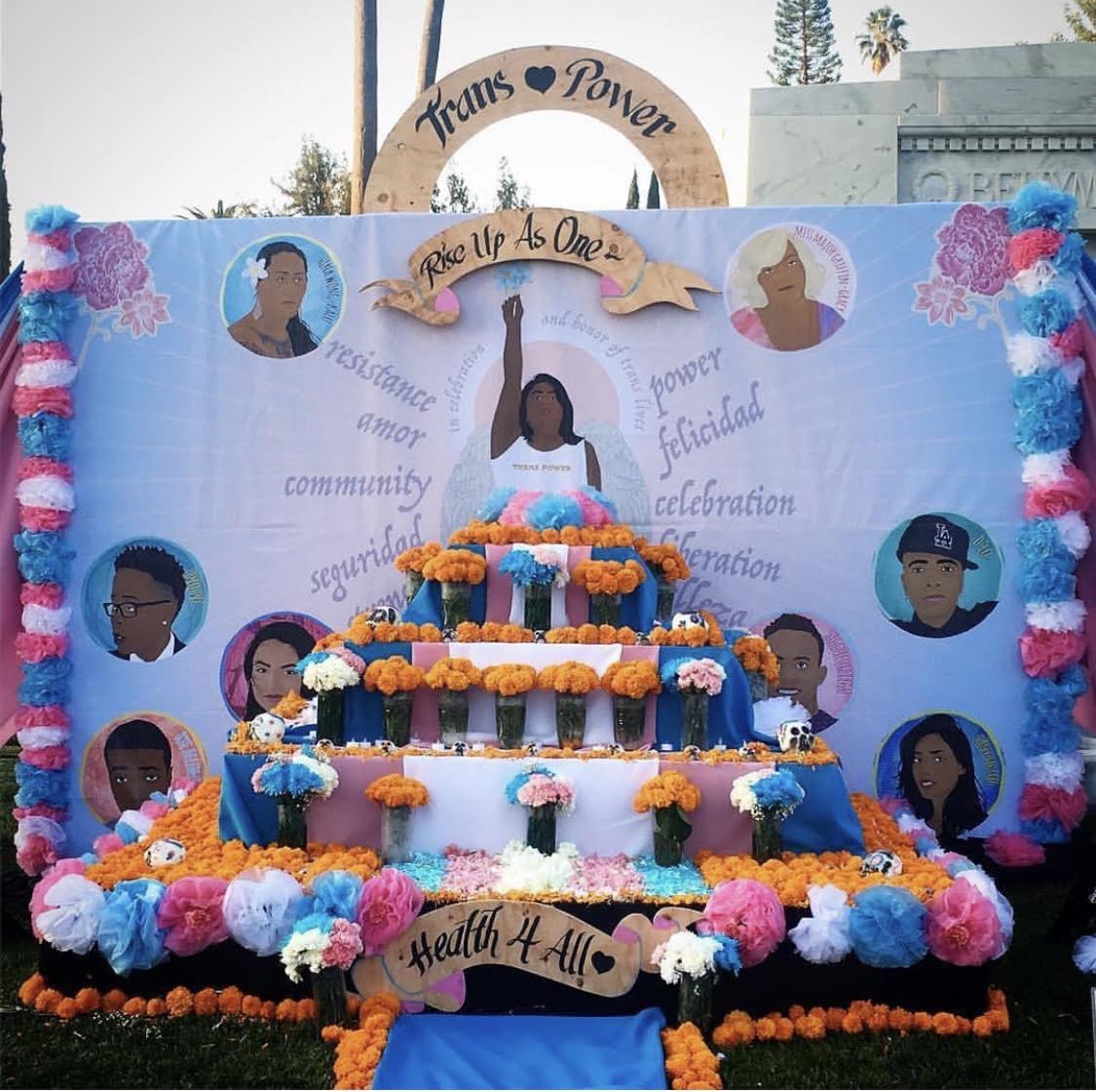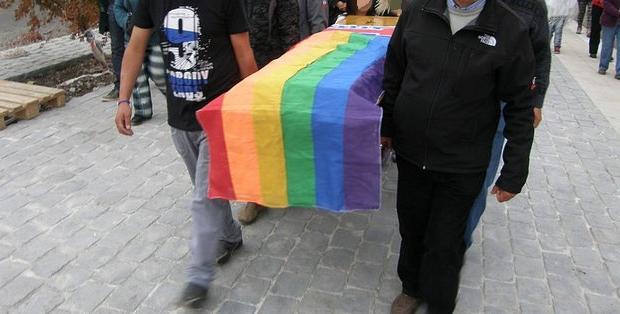“There would be lots of color, a parade down the street, with people carrying portraits of her. Music and laughter; a New Orleans style funeral,” said Fay.
Fay Slift, also known as The Lady Bear Extraordinaire, is a well-known Toronto drag performer who helps run the wildly successful Story Time With Drag Queens, where children hear their favorite story from a larger-than-life princess. Monday through Friday Fay teaches at an elementary school. I’ve asked her to imagine what a perfect drag funeral would look like.
“Everything about drag,” she says, “Is full of life. It’s humorous, ironic, and it’s over the top. Full of color and a celebration,” she goes on, clearly enjoying imagining this kind of gala. “A drag funeral should be just that.”

But is that possible?
I set out to write this article with a simple question: what is it like to die, queer, in 2018?
In 2005, Canada became the fourth country in the world to give people the legal right to marry someone of the same gender. I live my life in my early thirties as an openly gay man, experiencing no prejudice from my friends, family or employer – but what might it be like at the end of my life? What about people of my community who don’t enjoy the same acceptance that I do?
Nathan Romagnoli owns Eco Funeral in Toronto, but for many years he worked at a large corporate funeral home, where he was not out of the closet.
“A woman called to make arrangements for someone, another woman,” He said, “She wouldn’t tell me who the deceased was. Eventually it became clear it was her wife who had died, but the woman I was speaking with didn’t know if she was in a safe place where she could disclose that. It’s just lucky she called, and happened to get me.”
The sad truth is, as Nathan explained to me, if she had by chance, got a different director at the same home she may not have been in a safe place.
Nathan’s instincts were reinforced by his boss at the funeral home where he worked.
“He’d invite me over to dinner with him and his wife. He understood who I was, but he later told me that for my work, I should never disclose that part of myself,” Nathan said.
Jake (name changed) is a director at a funeral home in the gay village of Toronto which operates as part of the Dignity Memorial group, based in Texas. Their website offers the platitude, “Celebrating each life like no other.” They operate over ten funeral homes in Toronto.
When I spoke to Jake on the phone I briefly outlined what I was writing about and why I wanted to talk to him. He mentioned his home’s ‘deep ties’ to the local (ie gay) community and how they felt it was an honor to help people from the community.
I asked if we could sit down and talk and Jake told me to email him to set up a time.
Jake needed the permission of the funeral home’s district manager to talk to me, and that person was on vacation. When they got back, Jake told me he would need to talk to the head office before he could speak with me. I was later told, the managers would have to speak to their communications and media relations departments before he could talk to me, and asked if I could submit a list of every question I might want to ask during the interview.
I am writing this article six weeks after my initial contact with Jake, and all I can really say is that when asked about funerals for people in the queer community, the Dignity Memorial Group was not forthcoming.
Stanton has a gravely voice and, when the humidity cooperates, a perfect pompadour. He has broad shoulders and a slightly louche 5-o’clock shadow.
When he went to the emergency room in a Toronto hospital not too long ago he was assigned a nurse that would only refer to him as the female she believed he was born as.
“I’m lucky. My family is, “in the know,” I guess you’d say,” he said.
Stanton, like many of us, hasn’t thought too much about his death, and he is lucky that his family knows who he is.

“Making plans yourself is so important, know what you want and tell someone (a funeral director).” said Laura Sussman.
Laura is co-owner of Kraft-Sussman Funeral and Cremation Services, a home that was recognized by The New Yorker for helping families of the victims in the Las Vegas mass shooting last year. She spoke to me on the phone in the midst of a hectic day at her funeral home.
The death of a person often inspires an ‘ownership’ battle over the deceased. If the person who died does not have a will or advance directive designating an agent, the decisions for planning their after-death care fall to their legal partner, if they have none, control falls to their parents who must make the decisions. If the parents are dead, their siblings. If they have no siblings, an aunt or uncle; and so on. This can become particularly problematic within the queer community, where being estranged from one’s family is not uncommon.
Laura told me the story of a trans woman who her home took care of. The woman had come from a Jewish orthodox family who, it seemed, she was no longer close with. Upon her death she had not left a will and had no legal partner, so decisions concerning her after-life care fell to her family. They insisted that her body be washed and prepared by male family members as is the tradition for male orthodox Jews.
Her family swooped in and decided how they wanted the person they thought of as their son taken care of, ignoring not only what, presumably, would have been her choice, but also her life and who she was.
This underlines Stanton’s story. Although acceptance in our society has grown, and many people are able to live their lives and be who they are, at times of crisis or moments in life where they are not able to speak for themselves, the ability to retain that freedom and maintain their identity can be greatly compromised.
“So many folk in the trans community don’t get a proper death,” Stanton told me, “The rate for murder is so much higher than cis-gendred people, the number of people that are street involved. It’s just so different.”
No one likes to think they that the life they are going about day to day will end, but there is no escaping the fact that one day, you too, will die. This thought is important for everyone, but even more so for people who are part of the queer community.

The unfortunate truth is that, unless you make legal decisions in life, your chosen family may be silenced when it comes to your after-life decisions.
“Her funeral was terrible,” Fay told me about the service for a well-known Toronto drag queen. “I mean, I guess they tried, but it didn’t work.”
The service she described had many of the costumes of the queen who passed away laid over the backs of chairs. It’s easy to imagine sparkling, sequined gowns with gloves and hats draped over the backs of chairs as though discarded.
“I would have had mannequins,” Fay said. “These clothes, these costumes, had so much life in them, they should have been displayed in a way that continued that.”
When I spoke to them I asked both Nathan and Laura about a drag queen funeral and if someone wanted their drag mother (the queen that taught them how to do drag) to do their post-mortem makeup.
“Its not uncommon to have a family member come in to help prepare the body,” said Nathan, “So I don’t see the difference.”
The tag line of Nathan’s funeral home is “Life Celebrations Done Uniquely,” and his sentiments in our conversation echoed what Fay imagined, the rituals surrounding the end of a person’s life should reflect their life, however they lived it.

